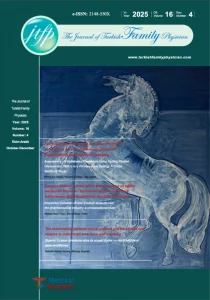Determination of vaccine hesitancy and refusal among parents of children aged 0–4 years applying to a Family Health Center
Aim: Vaccines have proven their effectiveness in stopping major epidemics however, the growing vaccine hesitancy and refusal in recent times have emerged as a significant threat to global health. Distrust in vaccine content, misinformation spread through social media, and concerns about post-vaccination side effects have contributed to families experiencing hesitation in getting vaccinated. This study aims to determine the reasons for vaccine hesitancy and refusal among parents of children aged 0-4 years and the factors affecting them.
Methods: Data for this descriptive and cross-sectional study were collected through face-to-face interviews from 249 parents of children aged 0-4 years who applied to Istanbul Hilmi Şahin Family Health Center between September and December 2024. The Introductory Information Form, WHO SAGE Vaccine Hesitancy Scale, and Vaccine Opposition Scale were used as data collection tools.
Results: The mean age of the participants was 33.55±5.39 years; 83.5% were female, 63.5% had a university degree or higher. 89.6% stated that they had routine vaccinations, and 10.4% refused vaccinations. The most rejected vaccines were the DTaP-IPV/Hib (76.9%) and PCV13 (69.2%). The rate of those who are concerned about vaccine safety is 30.5%, and these individuals have significantly higher vaccine hesitancy and opposition scores (p<0.001).
Conclusion: Significant relationships were found between vaccine hesitancy and refusal and factors such as the education level of the parents, the income status, and the perception of vaccine safety. These findings support the development of personalized education strategies to increase the vaccine acceptance of parents.



